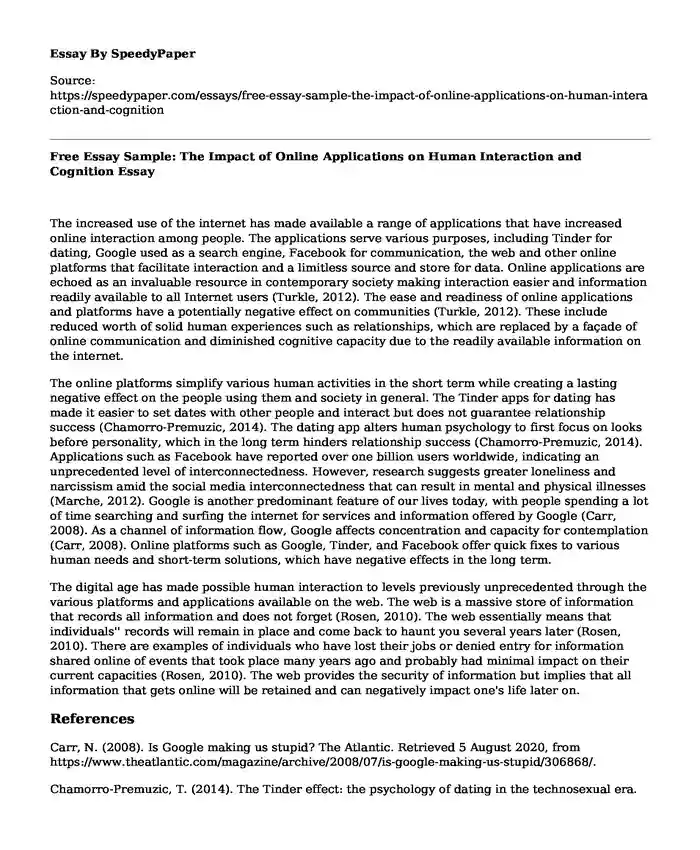
| Type of paper: | Essay |
| Categories: | Internet Relationship Cognitive development |
| Pages: | 2 |
| Wordcount: | 523 words |
The increased use of the internet has made available a range of applications that have increased online interaction among people. The applications serve various purposes, including Tinder for dating, Google used as a search engine, Facebook for communication, the web and other online platforms that facilitate interaction and a limitless source and store for data. Online applications are echoed as an invaluable resource in contemporary society making interaction easier and information readily available to all Internet users (Turkle, 2012). The ease and readiness of online applications and platforms have a potentially negative effect on communities (Turkle, 2012). These include reduced worth of solid human experiences such as relationships, which are replaced by a façade of online communication and diminished cognitive capacity due to the readily available information on the internet.
The online platforms simplify various human activities in the short term while creating a lasting negative effect on the people using them and society in general. The Tinder apps for dating has made it easier to set dates with other people and interact but does not guarantee relationship success (Chamorro-Premuzic, 2014). The dating app alters human psychology to first focus on looks before personality, which in the long term hinders relationship success (Chamorro-Premuzic, 2014). Applications such as Facebook have reported over one billion users worldwide, indicating an unprecedented level of interconnectedness. However, research suggests greater loneliness and narcissism amid the social media interconnectedness that can result in mental and physical illnesses (Marche, 2012). Google is another predominant feature of our lives today, with people spending a lot of time searching and surfing the internet for services and information offered by Google (Carr, 2008). As a channel of information flow, Google affects concentration and capacity for contemplation (Carr, 2008). Online platforms such as Google, Tinder, and Facebook offer quick fixes to various human needs and short-term solutions, which have negative effects in the long term.
The digital age has made possible human interaction to levels previously unprecedented through the various platforms and applications available on the web. The web is a massive store of information that records all information and does not forget (Rosen, 2010). The web essentially means that individuals'' records will remain in place and come back to haunt you several years later (Rosen, 2010). There are examples of individuals who have lost their jobs or denied entry for information shared online of events that took place many years ago and probably had minimal impact on their current capacities (Rosen, 2010). The web provides the security of information but implies that all information that gets online will be retained and can negatively impact one's life later on.
References
Carr, N. (2008). Is Google making us stupid? The Atlantic. Retrieved 5 August 2020, from https://www.theatlantic.com/magazine/archive/2008/07/is-google-making-us-stupid/306868/.
Chamorro-Premuzic, T. (2014). The Tinder effect: the psychology of dating in the technosexual era. The Guardian. Retrieved 5 August 2020, from https://www.theguardian.com/media-network/media-network-blog/2014/jan/17/tinder-dating-psychology-technosexual.
Marche, S. (2012). Is Facebook making us lonely? The Atlantic. Retrieved 5 August 2020, from https://www.theatlantic.com/magazine/archive/2012/05/is-facebook-making-us-lonely/308930/.
Rosen, J. (2010). The web means the end of forgetting. Nytimes.com. Retrieved 5 August 2020, from https://www.nytimes.com/2010/07/25/magazine/25privacy-t2.html?pagewanted=all&_r=0.
Turkle, S. (2012). Connected, but alone? Ted.com. Retrieved 5 August 2020, from https://www.ted.com/talks/sherry_turkle_connected_but_alone#t-226408.
Cite this page
Free Essay Sample: The Impact of Online Applications on Human Interaction and Cognition. (2023, Nov 05). Retrieved from https://speedypaper.net/essays/free-essay-sample-the-impact-of-online-applications-on-human-interaction-and-cognition
Request Removal
If you are the original author of this essay and no longer wish to have it published on the SpeedyPaper website, please click below to request its removal:
- Essay Example on the Role of Internet in Determining the Success of Business
- Essay Example on Norman Knight Center for Clinical and Professional Development
- Free Essay Example on Why People Take Pictures
- Finding a New Job - Essay Sample
- Windows Network Proposal - Networking: Paper Example
- Navigating Leadership: A Personal Journey Through Dimensions and Actions - Personal Development Paper
- Paper Example: How to Implement a Customer Relationship Management System
Popular categories




